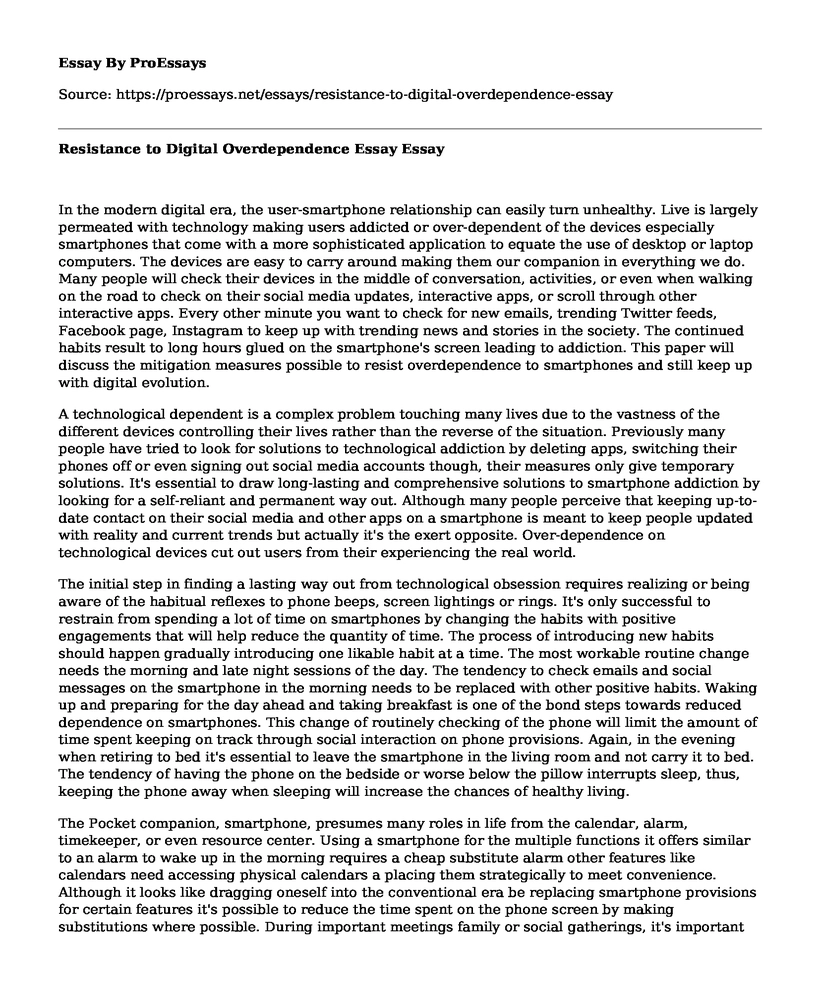In the modern digital era, the user-smartphone relationship can easily turn unhealthy. Live is largely permeated with technology making users addicted or over-dependent of the devices especially smartphones that come with a more sophisticated application to equate the use of desktop or laptop computers. The devices are easy to carry around making them our companion in everything we do. Many people will check their devices in the middle of conversation, activities, or even when walking on the road to check on their social media updates, interactive apps, or scroll through other interactive apps. Every other minute you want to check for new emails, trending Twitter feeds, Facebook page, Instagram to keep up with trending news and stories in the society. The continued habits result to long hours glued on the smartphone's screen leading to addiction. This paper will discuss the mitigation measures possible to resist overdependence to smartphones and still keep up with digital evolution.
A technological dependent is a complex problem touching many lives due to the vastness of the different devices controlling their lives rather than the reverse of the situation. Previously many people have tried to look for solutions to technological addiction by deleting apps, switching their phones off or even signing out social media accounts though, their measures only give temporary solutions. It's essential to draw long-lasting and comprehensive solutions to smartphone addiction by looking for a self-reliant and permanent way out. Although many people perceive that keeping up-to-date contact on their social media and other apps on a smartphone is meant to keep people updated with reality and current trends but actually it's the exert opposite. Over-dependence on technological devices cut out users from their experiencing the real world.
The initial step in finding a lasting way out from technological obsession requires realizing or being aware of the habitual reflexes to phone beeps, screen lightings or rings. It's only successful to restrain from spending a lot of time on smartphones by changing the habits with positive engagements that will help reduce the quantity of time. The process of introducing new habits should happen gradually introducing one likable habit at a time. The most workable routine change needs the morning and late night sessions of the day. The tendency to check emails and social messages on the smartphone in the morning needs to be replaced with other positive habits. Waking up and preparing for the day ahead and taking breakfast is one of the bond steps towards reduced dependence on smartphones. This change of routinely checking of the phone will limit the amount of time spent keeping on track through social interaction on phone provisions. Again, in the evening when retiring to bed it's essential to leave the smartphone in the living room and not carry it to bed. The tendency of having the phone on the bedside or worse below the pillow interrupts sleep, thus, keeping the phone away when sleeping will increase the chances of healthy living.
The Pocket companion, smartphone, presumes many roles in life from the calendar, alarm, timekeeper, or even resource center. Using a smartphone for the multiple functions it offers similar to an alarm to wake up in the morning requires a cheap substitute alarm other features like calendars need accessing physical calendars a placing them strategically to meet convenience. Although it looks like dragging oneself into the conventional era be replacing smartphone provisions for certain features it's possible to reduce the time spent on the phone screen by making substitutions where possible. During important meetings family or social gatherings, it's important to mute the phone to fully concentrate on the events of activates taking place. This habit will call for disciplined time allocation to integrate all aspects of life like work, social time, and family time. Though, working hours requires much time of our day it's essential to respect the short time we spend with family and friends and avoid rude habits of being talked to when still glued to our phones. Lastly, it's important to reconfigure the smartphone notification rolls by silencing the notification depending on routine schedules.
Conclusion
In conclusion, identification of technological harms in our life health or socially does not necessarily mean we are being old versioned or Luddite. It's essential to keep on track on the digital advent but still keep in mind that too much of anything is dangerous to the user. Overdependence on a smartphone requires the essentially individual realization of the harm the phone is causing to their life and liberates them in a gradual process.
References
Horner, K. (2017) When 'Use' Becomes 'Dependence': A Critical Analysis of Our Reliance on Technology, Digital Society
Cite this page
Resistance to Digital Overdependence Essay. (2022, May 17). Retrieved from https://proessays.net/essays/resistance-to-digital-overdependence-essay
If you are the original author of this essay and no longer wish to have it published on the ProEssays website, please click below to request its removal:
- Experience From Your Life That Changed the Way You Think Essay
- High Inpatient Readmission Rates for Persons with Schizophrenia Patients: A Critical Issue in Mental Healthcare
- Determining Personal Truth Essay Example
- Paper Example on Achieve Success With Learning Agility & Strategy
- Paper Example on Parental Influence on Child's Social Skills: Impact on Mental Wellness
- Paper Sample on McDonald's: A Global Success Story of 30k Stores and 15bn Incomes
- Free Essay Example on Youth: Peer Influence Shaping Teen Behaviors & Choices







